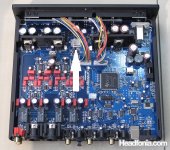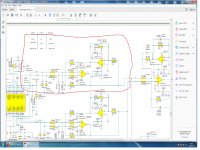Hi Guys,
I previously got help on an old Amplifier with no name to increase bass with result so I thought I would try this circuit which is a Dacmagic that uses NE5532 chip.
The problem is the bass is just rubbish! I tried a friends newly purchased Arcam DAC for £150 and thought why does my Dacmagic lack the bass the Arcam has.
I presume the main opamps can be tuned rather than replaced to produce better bass. I use a XLR 3 pin connection which doesnt uses the other opamp for output but still the bass is just thin!
The only tuning I have done is replace the main DAC capacitor and removed the decoupling output capacitors. The sound improved in terms of clarity but honestly I like bass and it just sounded so thin in comparison
Please help!
I previously got help on an old Amplifier with no name to increase bass with result so I thought I would try this circuit which is a Dacmagic that uses NE5532 chip.
The problem is the bass is just rubbish! I tried a friends newly purchased Arcam DAC for £150 and thought why does my Dacmagic lack the bass the Arcam has.
I presume the main opamps can be tuned rather than replaced to produce better bass. I use a XLR 3 pin connection which doesnt uses the other opamp for output but still the bass is just thin!
The only tuning I have done is replace the main DAC capacitor and removed the decoupling output capacitors. The sound improved in terms of clarity but honestly I like bass and it just sounded so thin in comparison
Please help!
Attachments
If it doesn't seem like there is enough bass sometimes it can be because there is too much HF distortion which makes the sound too bright, or sometimes bass can be weak if an opamp or dac chip is not getting enough low frequency power bypassing or otherwise doesn't have a low enough impedance path back to the power supply. If you look at the frequency spectrum with some test tones and or maybe using some pink noise you might be able to get a better idea of what is causing the problem. Usually it sounds better to find and fix the actual problem rather than trying to EQ up the bass instead.
Removing decoupling caps would be a bad idea, if anything you might need a lot more of them in larger sizes.
Removing decoupling caps would be a bad idea, if anything you might need a lot more of them in larger sizes.
Hi Guys,
I previously got help on an old Amplifier with no name to increase bass with result so I thought I would try this circuit which is a Dacmagic that uses NE5532 chip.
The problem is the bass is just rubbish! I tried a friends newly purchased Arcam DAC for £150 and thought why does my Dacmagic lack the bass the Arcam has.
I presume the main opamps can be tuned rather than replaced to produce better bass. I use a XLR 3 pin connection which doesnt uses the other opamp for output but still the bass is just thin!
The only tuning I have done is replace the main DAC capacitor and removed the decoupling output capacitors. The sound improved in terms of clarity but honestly I like bass and it just sounded so thin in comparison
Please help!
"Rubbish" means nothing to me except you're not happy. How about some measurements? Pink noise, square wave response and sweeps can be very revealing. I use Adobe Audition 3 to make test signals all the time. I don't prefer Audacity but it does noise and tones and might do sweeps as well. Identifying response is far more useful.
G²
Thanks for the inputs but some of what you guys are saying is a bit beyond me.
I'm not sure what the oscillator stage is!
The new caps actually improved the sound. The bass was always a bit shy/thin!
The unit is screwed back so internal photos are a bit difficult. I will open it back once a solution is found. It's a pain too has 20 screws at the back and 3 difficult ones internally.
I have a solder yourself oscilloscope I bought for £20 but don't really know how to use it.
I have read before about bypassing power pins with .1uf I will attempt this once I open it back up.
I read on a long thread to remove the decoupling caps to improve sound quality and it really did improve. It was discussed it's only for DC offset. There was none so I removed it.
Thanks guys
I'm not sure what the oscillator stage is!
The new caps actually improved the sound. The bass was always a bit shy/thin!
The unit is screwed back so internal photos are a bit difficult. I will open it back once a solution is found. It's a pain too has 20 screws at the back and 3 difficult ones internally.
I have a solder yourself oscilloscope I bought for £20 but don't really know how to use it.
I have read before about bypassing power pins with .1uf I will attempt this once I open it back up.
I read on a long thread to remove the decoupling caps to improve sound quality and it really did improve. It was discussed it's only for DC offset. There was none so I removed it.
Thanks guys
X1, square can between the two heatsinks.Thanks for the inputs but some of what you guys are saying is a bit beyond me.
I'm not sure what the oscillator stage is!

Word is that these NDK NZ2520SDA 3.3V 49.152Mhz 45.1584Mhz 24.576Mhz 22.5792Mhz Ultra low phase noise oscillator - DIYINHK oscillators are the one to go for.
Dan.
You could solder fine wires to the existing pcb holes/pads and then place/solder the osc module to those with tiny solder fillets...I'm not sure of your skill level and tools.That oscillator looks amazing! And hard to solder!
On closer inspection they look to have done some 'voicing' in the power supplies.....R400 & R401 are 56R 2W carbon resistors, R107 2R2 2W.I'm more confident in soldering capacitors to be honest.
You could try swapping different resistor types here, ie 5W Wire Wound or Metal Film (4 x 220R 0.6W in parallel) for R400, R401 and 4 x 8R2 MF in parallel for R107.
These resistors are before PS regulation, decoupling, reticulation etc but they can have a subjective influence IME....easy to change and cheap....possibly worth trying provided your soldering skills are good.
Dan.
Resistors are not too expensive either! But it it necessarily give better bass?
I think you have a different problem, but it's hard to say what. There is no LF rolloff
in that circuit, save the output coupling capacitors (not shown) that you have removed.
If there is normally an output DC voltage offset before the output capacitors, then removing
them could cause a problem.
Last edited:
IME carbon resistors can add/cause a warm but slightly 'dirty' sound with diminished bass......ie reduced sense of 'power'.I'm happy to try that too. Resistors are not too expensive either! But it it necessarily give better bass?
I know that these resistors are way up the front of the power supply, but IME the LF/VLF noise of carbon resistors can cause an 'instability' that kills bottom end bass power and definition.
Quick, easy and cheap mod, you can try ceramic 5W/2W WW resistors or MF and see if you get a different sound and maybe more to your liking.
Dan.
Last edited:
IME carbon resistors can add/cause a warm but slightly 'dirty' sound with diminished bass......ie reduced sense of 'power'.
Dan.
And why would that be?
Low phase noise oscillator will improve lows.
Oh. How?
Word is that these NDK NZ2520SDA 3.3V 49.152Mhz 45.1584Mhz 24.576Mhz 22.5792Mhz Ultra low phase noise oscillator - DIYINHK oscillators are the one to go for.
Dan.
To increase bass output level?
Last edited:
It's about 1/f noise....good clocks minimise LF/close in (1/f) noise.
Stable clock sets 'solid foundation' in the reproduced sound.
Carbon resistors add 1/f noise.
1/f noise (clock induced noise included) causes IM and AM which serves to subjectively 'scatter' bass power and clarity.
TF are 1/f very noisy, decades more so than MF...why they would specify noisy resistors for the digital stages I am not certain.
The 1% MELF resistors in the analogue stages are suspect also....they can be carbon or MF and the schematic does not specify.
Dan.
Stable clock sets 'solid foundation' in the reproduced sound.
Carbon resistors add 1/f noise.
1/f noise (clock induced noise included) causes IM and AM which serves to subjectively 'scatter' bass power and clarity.
TF are 1/f very noisy, decades more so than MF...why they would specify noisy resistors for the digital stages I am not certain.
The 1% MELF resistors in the analogue stages are suspect also....they can be carbon or MF and the schematic does not specify.
Dan.
- Status
- This old topic is closed. If you want to reopen this topic, contact a moderator using the "Report Post" button.
- Home
- Source & Line
- Analog Line Level
- NE5532 circuit. I need more bass. Help!!
